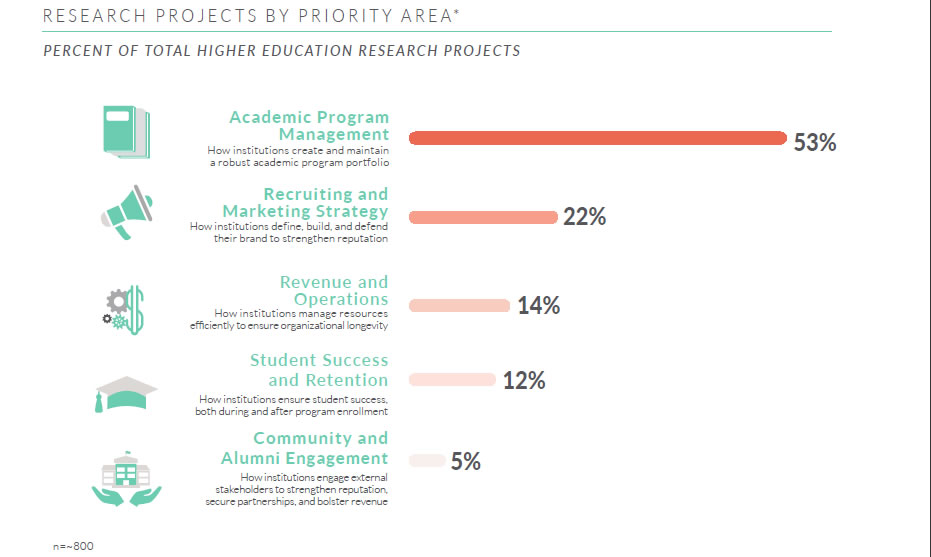Just like 2016’s improvement trends, academic program creation and evaluation was top-of-mind with institutions. However, this year colleges and universities looked to diversify their program portfolios, either through offering online or blended learning offerings, through offering micro-credentials, or by placing their bets on emerging programs.
This is just one of the trends highlighted in Hanover Research’s 2017 Industry Trend Report, which studies the impact of these improvement trends across the 800 research projects commissioned by over 300 higher education clients (Hanover’s client list includes Georgetown University, Gonzaga, Johns Hopkins, Texas A&M, and Wake Forest to name a few). Hanover’s research work spans all institutional type—four-year, community college, business schools, law schools—as well as departments like marketing, academic affairs and finance/operations.
What’s also noteworthy this year is that Hanover has gone a step further in identifying the overarching improvement trend of academic program creation and review by including a list of the top high-growth and emerging programs in higher ed at the moment.
“Facing declining enrollments and reductions in funding across key academic offerings, higher education institutions diversified their program offerings, experimenting with new teaching methods, and emphasizing the value in higher education to key external stakeholders,” states the report.
Here are 6 improvement trends for 2017 highlighted in the report based on college and university research projects:
1. The top priority for every institution is to expand and align their program portfolios to meet student and industry demand: Over 50 percent of Hanover’s higher ed projects in the past year focused on the creation or review of academic programs. Within this broad category, 77 percent of requests related to New Program Development, as institutions requested Hanover’s expertise in performing scans for high-demand degrees or more targeted evaluations of the feasibility of specific programs. Common programs of interest included: Master of Social Work, all degrees related to nursing, and all degrees related to nutrition/food science.

2. Institutions explored alternative delivery formats: Nearly 1 in 5 New Program Development projects either focused specifically on identifying high-demand programs that could be delivered in online formats, or included investigations of traditional, distance, and blended offerings.
3. Law schools sought to bolster their recruiting and marketing strategies: Recruiting and marketing strategies accounted for 50 percent of law schools research requests and 34 percent of business school requests in 2016.
(Next page: 3 more improvement trends; a high-demand program list)
4. Community colleges focused on driving student success and retention: About 30 percent of projects requested by community colleges focused on Student Success and Retention topics, including developmental education, English as a Second Language, closing achievement gaps, and student persistence to degree completion.
5. Departmental research prioritized Academic Program Management and Recruiting and Marketing Strategy: Compared to other departments, Academic Affairs and Enrollment Management had the highest frequencies of requests for projects related to Academic Program Management (with 63 percent and 58 percent respectively). Similarly, requests for projects related to Recruiting and Marketing Strategy were most frequently requested by Finance and Operations and Marketing and Communications departments (with 31 percent and 37 percent respectively).

6. The most common research method applied to address institutions’ challenges was secondary research (59 percent), including literature reviews, best practice studies, environmental studies, and market evaluations. However, 36 percent of project requests featured primary research (surveys, in-depth interviews, and focus groups), while 11 percent involved quantitative data analysis (non-survey data segmentation, regression modeling, and trend forecasting).
The Most High-Growth and In-Demand Emerging Programs in Higher Ed
Thanks to Hanover’s proprietary New Program Opportunity Dashboard, colleges and universities can spot “high-growth” and “potentially emerging” programs, based on the Compound Annual Growth Rate (CAGR) and total number of degree conferrals between 2011 and 2015 (full definitions of high-growth and potentially emerging are listed in the report). Full methodology of the Dashboard is explained in the report.
According to the report’s sneak peek section, some of the “high-growth” programs to watch in 2017 include:
Bachelor’s
- Registered Nursing, Nursing Admin, Nursing Research and Clinical Nursing
- Biology, General
- Criminal Justice and Corrections
- Health and Physical Education/Fitness
- Mechanical Engineering
- (More are listed in the report)
Master’s
- Registered Nursing, Nursing Admin, Nursing Research and Clinical Nursing
- Social Work
- Accounting and Related Services
- Public Health
- Electrical, Electronics, and Communications Engineering
- (More are listed in the report)
Some of the “potentially emerging” programs in 2017 include:
Bachelor’s
- Homeland Security
- Cognitive Science
- Environmental/Environmental Health Engineering
- Human Biology
- Petroleum Engineering
- (More are listed in the report)
Master’s
- Homeland Security
- Research and Experimental Psychology
- Dietetics and Clinical Nutrition Services
- Arts, Entertainment, and Media Management
- Applied Mathematics
- (More are listed in the report)
For much more information, including methodology and case profiles, read the full report here.
- 25 education trends for 2018 - January 1, 2018
- IT #1: 6 essential technologies on the higher ed horizon - December 27, 2017
- #3: 3 big ways today’s college students are different from just a decade ago - December 27, 2017

